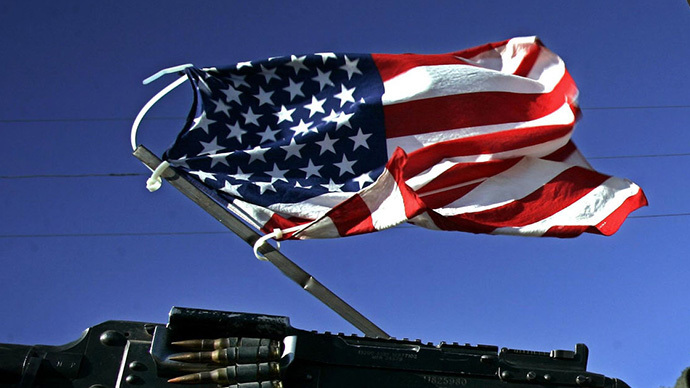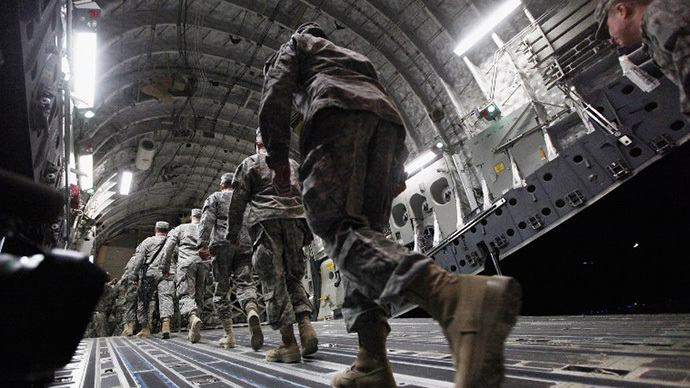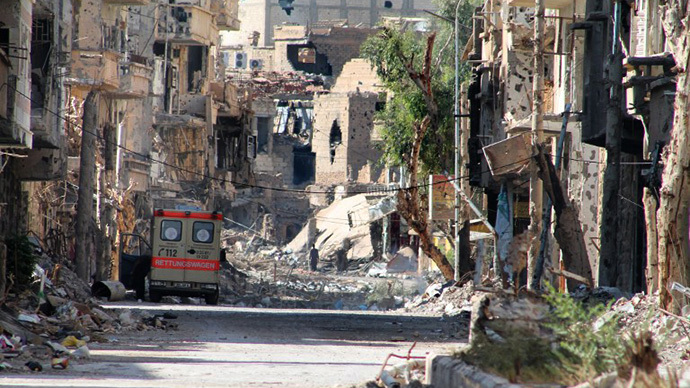US uses international law, UN to own advantage in Middle East

The US is using international law in accord with its national interests “in terms of its global agenda for domination,” Debra Sweet, director of the World Can't Wait movement, told RT, adding that Washington created a terrible mess in the Middle East.
“International law is not as important as what the US wants at any particular time", Sweet said in an interview with RT.
“Even though they use international law, when it is to their advantage, they use the UN. What deterrence the United States does at any particular time, including right now, is what its own national interests dictate in terms of its global agenda for domination and its particular interests in the Middle East. However, they have created a terrible mess.”
“[It is] pretty clear chemical weapons had been used in Syria” said US Defense Secretary Chuck Hagel. “We have moved assets in place to be able to fulfill and comply with whatever option the president wishes to take.”
RT: Recalling recent modern US history we've witnessed examples of America's intervention in different conflicts: Kosovo, Iraq, Libya... What is Washington's main drive in its foreign policy?
Debra Sweet: Well, I think it’s like the other big powers – quite definitely so. There may be incidences of humanitarian [intervention], incidences that come along that the US responds to, but its main drive is its own interest, pursuing its own global agenda. And this is across every country and every sphere. And we learnt this more from WikiLeaks, didn’t we? And the cables [show] that the US pursues this interest, relentlessly, no matter what is going on with the people of a particular country.
RT: How legitimate were Washington's actions then and how supportive were other nations to the US?
DS: Well, let’s look at the decisions and actions that the US took in the wake of 9/11. First of all, a very rapid intervention into Afghanistan, which has gone on now for almost 12 years. The people of Afghanistan were not responsible for what happened on 9/11. That resulted actually quite quickly, when it seems that the US removed the foreign forces from Afghanistan, but has continued to carry on attacks against the people in Afghanistan. And it still hasn’t left aside the agreement to be there until 2024 with the current Afghan government.
Let’s look at Iraq, where the US went in on the basis of lies
that Saddam Hussein was responsible for 9/11, that he had weapons
of mass destruction, and that Al-Qaeda was involved in Iraq – all
of these things were demonstrably untrue at the time. And yet,
the argument from the Bush regime was, “We have no choice but to
go in there.” And they even went in virtually alone, not being
able to get the “coalition of the willing.” They got the
“coalition of the bullied” to go along with them, and that meant
terrible death and destruction for the people of Iraq, which
continues to this day.

RT: Why has the US frequently bypassed international opinion?
DS: Well, they create international opinion by doing what they do, and let others respond to it. And I wouldn’t let all the other big powers in the world off the hook either, because to the degree that their interest coincide with what the US wants, the US being the primary imperialist power at this point, other nations often go along with them or oppose them. But international law is not as important as what the US wants at any particular time. Even though they use international law, when it is to their advantage, they use the UN, what determines what the United States does at any particular time, including right now, is what its own national interests dictate in terms of its global agenda for domination and its particular interests in the Middle East. However, they have created a terrible mess.
RT: During the conflict in Libya a massive flow of arms entered the country. These are now spreading across the region. Isn't the West worried these same arms will be used to launch terrorist attacks against it?
DS: Yeah, you’re speaking about Mali and we can go back to what they did in Somalia by fueling an intervention by Ethiopia in 2007. Even what they did in Iraq had a huge amount of unintended consequences, actually strengthening the government of Iran, and creating across the whole region a lot of righteous anger. When it appears, and this is certainly the case, that the US has been at war with countries where the population is primarily Muslim and this continues. I would say that even in the last weeks in Egypt, of course, the US has been fueling and paying for the military government and the army literally for decades. The fact that they have temporarily stopped the flow of some military aid is primarily just for public consumption.
They are completely behind the military government in Egypt and had a lot to do with the elected President Morsi being deposed. I think he was probably given a choice of “you leave, or we’ll make sure that you’re gone.” This is how the US has operated. And again, this is how the other big powers, including France, Germany, the UK and Russia have operated, so this is of great concern to the rest of the people in the world, I’m sure. And it’s a big concern to those of us living in the United States, the biggest military power in world history.

The largest economy spreads its paws over a globalized universe of production, and this huge military is what keeps that in place. It is demonstrably against the interest of people around the world and in this country, as well, that the US stages these interventions. And that’s just the tip of the iceberg. There are secret dirty wars, such as Yemen and Somalia, going on all the time that we know very little about.
RT: As a result of the US intervention in Kosovo, the country broke up and some parts of it are still suffering a humanitarian disaster. Why is the US contemplating another intervention?
DS: Yes, this was not done for the reasons that many people wished it would have been done, around the world – to see the human suffering end in the slaughter that took place. This was done for the most cynical of reasons – for the US to keep control of this situation. Notwithstanding that warlords have been put into place and given power and loads of money all over the world, [there has] not been any possibility of treating the people of those countries well. This is the case in Kosovo, even going back to Salvador and some of the interventions the US engaged in Central America in the 80s under Reagan. Going way back, back to the use of nuclear weapons at the end of World War II, that was just a sign to the rest of the world that, “We from now on will not hesitate, we will be in charge.” And this is the heritage that we living with.
RT: The US intervened in Iraq under the pretext that the country possessed weapons of mass destruction. Now the US is claiming that Syrian government forces are using chemical weapons. Can the world trust America a second time round?
DS: Well, America is already in Syria. They have been in there through Turkey, through Saudi Arabian money, through Israel. They have already intervened in Syria. And I’m sure that they would wish that their interest could be served, perhaps, by not having to directly intervene. But it looks like that exactly is what they are contemplating. If they do something like [they did] in Libya, in this much more heavily populated country, there is going to be a human disaster – if they create a no-fly zone. And thousands of civilians, non-combatants are bombed. It’s just going to be a continuation of this terrible situation, when none of the parties have the interests of the people in mind or at heart, or have any capability of providing to them.
The statements, views and opinions expressed in this column are solely those of the author and do not necessarily represent those of RT.
The statements, views and opinions expressed in this column are solely those of the author and do not necessarily represent those of RT.












